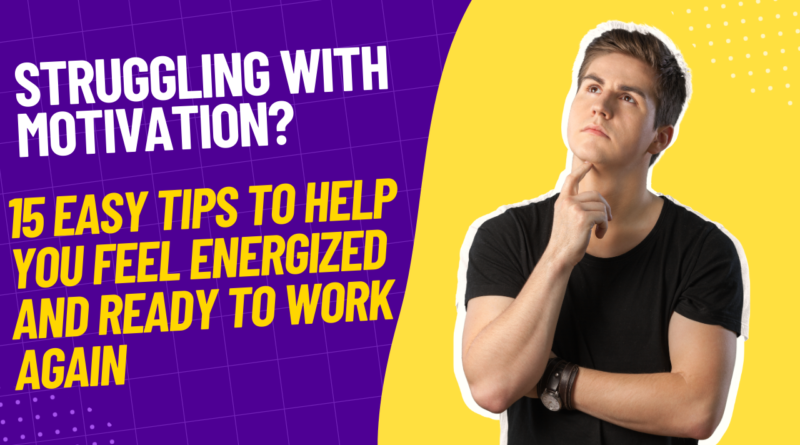Struggling with Motivation? 15 Easy Tips to Help You Feel Energized and Ready to Work Again
Waking up every morning with the thought, “I don’t want to work anymore,” can weigh heavily on your mind. This feeling can ruin your day, reduce your energy, and impact your overall happiness. It’s essential to recognize that feeling this way isn’t unusual, and it’s okay to feel this way from time to time. However, if this feeling persists, it’s crucial to explore the reasons behind it and discover ways to overcome it. This article will help you understand why you are struggling with motivation? 15 Easy Tips to Help You Feel Energized and Ready to Work Again
Why You Might Feel Like You Don’t Want to Work Anymore
Before jump into the solutions, it’s essential to understand why you might feel so unmotivated. Identifying the cause can help you take the right steps to improve your situation.
1. Struggling with Motivation
Struggling with Motivation happens when you are emotionally, mentally, and physically exhausted from your job. It’s more than just being tired; it’s a sense of feeling drained with no energy left to give. Struggling with Motivation often comes from being overworked, dealing with constant stress, or feeling overwhelmed by responsibilities. Modern life pressures us to juggle multiple things at once—jobs, families, and social lives—and this can lead to exhaustion.
To overcome Struggling with Motivation, it’s important to recognize when you’re reaching your limit and take a step back to rest and recharge.
2. Personal Life Stress
When things are tough in your personal life, it’s normal for that stress to bleed into your work. Personal challenges such as financial problems, relationship issues, or health concerns can make it difficult to focus at work. If you’re facing difficulties outside the office, it’s essential to acknowledge that your mind is preoccupied, and this can affect your job performance.
Don’t be hard on yourself for feeling distracted or unmotivated at work—it’s part of life’s ups and downs. Taking time to manage personal stress can help improve your work outlook.
3. Toxic Work Environment
No matter how much you enjoy the work itself, a toxic work environment can ruin your experience. Whether it’s an abusive boss, hostile coworkers, or a company culture filled with negative energy, toxicity at work is draining. Unfortunately, many people stay in these jobs because they need the paycheck, but in the long run, staying in such environments can harm your mental health and well-being.
If your workplace is toxic, it may be time to consider finding a healthier environment where you can thrive.
4. Misaligned Team Dynamics
Your work environment can be made or broken by the people around you. When you work with a supportive and collaborative team, you’re more likely to enjoy your job. However, if your team is filled with tension, poor communication, or office politics, it can make even a job you love feel unbearable.
Recognizing that it might not be the job itself, but the people around you who are affecting your enjoyment, is a crucial step. You may want to consider transferring to a different team or looking for a new role in the same field but with better dynamics.
5. Resisting the Return to the Office
The shift to remote work during the pandemic gave many workers a taste of a more flexible lifestyle. If you’re feeling resistant to returning to the office, you’re not alone. Remote work eliminates commuting time, provides more flexibility, and allows for a better work-life balance. Having to give that up and return to an office setting may be contributing to your dissatisfaction with work.
If working remotely suits your lifestyle better, it may be worth exploring job opportunities that allow for permanent remote work.
6. Lack of Fulfillment
Humans naturally seek growth and purpose. If your job feels stagnant or lacks meaning, it’s easy to become unmotivated. Maybe you’ve been doing the same tasks for years without any new challenges or learning opportunities. When you stop growing in your role, you might feel like you’re simply going through the motions.
If this sounds familiar, it may be time to seek out new challenges, either by requesting different tasks at your current job or exploring new career opportunities.
7. Feeling Unappreciated
Everyone wants to feel valued for their hard work. If you feel like your efforts go unnoticed or unappreciated, it’s natural to feel disheartened. A lack of recognition can make you question your self-worth and wonder if your contributions even matter.
While it’s important to seek internal validation, it’s also okay to desire acknowledgment from others. If you consistently feel unappreciated, it may be time to talk to your manager about your contributions or consider moving to a company that values your work.
15 Ways to Recover from Burnout and Find Joy in Your Work Again
Now that we’ve explored some reasons you might feel unmotivated at work, let’s jump into practical ways to overcome those feelings and regain a sense of fulfillment and balance in your career.
1. Take a Vacation
Sometimes, the best solution to burnout is taking time off. You may feel overwhelmed and disconnected from work because you haven’t had time to rest. Studies show that regular breaks and vacations are essential to maintaining long-term productivity and happiness. Use your vacation days to completely disconnect from work and focus on activities that bring you joy and relaxation.
A vacation allows you to return to work with a refreshed mindset and renewed energy.
2. Practice Gratitude
Gratitude helps shift your focus from what’s wrong in your job to what’s right. While your job may not be perfect, there are likely things you can appreciate, such as a steady paycheck, a flexible schedule, or opportunities to learn. Gratitude isn’t about ignoring the negatives, but about balancing them with the positives.
Start small by writing down a few things you’re thankful for each day. Over time, this practice can shift your mindset and help you view your job in a more positive light.
3. Help Others
Helping others is a powerful way to feel better about yourself and your job. Acts of kindness—whether it’s offering support to a colleague, volunteering your time, or simply giving someone a smile—can boost your mood and increase your sense of purpose.
When you shift your focus from your own challenges to helping others, you create a positive ripple effect that improves both your life and theirs.
4. Level Up Your Skills
If you’re feeling stuck or bored at work, it might be because you’re no longer learning or growing. Take the initiative to improve your skills and learn something new. This can be as simple as asking a colleague for advice, signing up for an online course, or attending a workshop.
Improving your skills not only boosts your confidence but can open up new opportunities for career advancement or different roles that may be more fulfilling.
5. Adjust Your Expectations
Sometimes, our dissatisfaction with work comes from unrealistic expectations. Maybe you expected a promotion that didn’t happen, or perhaps you thought your job would be more fulfilling than it turned out to be. It’s essential to reflect on why you chose this job and what it realistically can provide.
Revisiting your expectations and aligning them with your current reality can help you gain a more balanced perspective on your job and what it offers.
6. Take Breaks During the Day
Taking short breaks throughout the day can work wonders for your mental and physical well-being. Breaks help reduce stress, boost creativity, and improve focus. Whether it’s a quick walk outside, a stretch, or a few minutes of deep breathing, breaks allow your brain to reset and prevent burnout.
Make it a habit to step away from your desk regularly, even if it’s just for a few minutes.
7. Embrace Life Outside of Work
It’s easy to get caught up in work and forget that there’s more to life than your job. To feel more balanced, make sure you’re cultivating a rich and fulfilling life outside of work. Spend time with friends and family, explore hobbies, and nurture your relationships.
Having a full life outside of work helps put your job into perspective, making it just one part of a well-rounded and fulfilling life.
8. Practice Mindfulness Before Work
Starting your day with mindfulness can set a positive tone for the rest of your day. Whether it’s a few minutes of meditation, journaling, or deep breathing, practicing mindfulness helps you center yourself and prepare mentally for the day ahead.
By taking a moment to reflect on your thoughts and feelings before diving into work, you’ll feel more grounded and less reactive to stress throughout the day.
9. Create an Exit Plan
If you’ve tried everything and still feel that your current job isn’t a good fit, it may be time to plan your exit. Start by updating your resume, exploring job opportunities, and networking with others in your industry. Having a clear exit strategy will make the process of leaving your job less overwhelming and give you something to look forward to.
It’s also helpful to save money during this transition period, so you have financial security as you explore new job options.
10. Explore a Side Hustle
If you’re passionate about something outside of your current job, consider starting a side hustle. This can be anything from freelancing in your field to selling handmade crafts. A side hustle gives you the freedom to pursue your interests and could even turn into a full-time career if it becomes successful.
Starting a side hustle allows you to explore new passions and gives you a creative outlet outside of your regular job.
11. Set Boundaries Around Work
To maintain a healthy work-life balance, it’s crucial to set boundaries around your job. This might mean not checking emails after hours, avoiding work-related conversations during personal time, or designating specific times for work and relaxation. Setting boundaries helps prevent work from taking over your personal life.
By establishing clear boundaries, you protect your mental health and ensure you have time for the things that matter most outside of work.
12. Pick Up a Hobby
Having a hobby outside of work can bring joy and fulfillment to your life. Whether it’s painting, gardening, reading, or playing a sport, hobbies provide an escape from the stresses of work and offer a sense of accomplishment.
Engaging in activities you enjoy outside of work can help reduce stress and make the workday feel less overwhelming.
13. Set New Goals
Feeling unmotivated at work often stems from a lack of direction. If your job has become repetitive or uninspiring, setting new goals can reignite your sense of purpose. These goals can be small, like organizing your workspace, or larger, like learning a new skill or taking on a challenging project.
Having clear goals gives you something to strive for and can make your daily tasks feel more meaningful.
14. Ask for Help
If you’re feeling overwhelmed, don’t be afraid to ask for help. Talk to your manager about your workload, ask a mentor for advice, or open up to a trusted colleague. Sometimes, simply sharing your feelings with someone else can provide relief and lead to helpful solutions.
Asking for help isn’t a sign of weakness—it’s a way to ensure you have the support you need to succeed.
15. Reconnect with Your “Why”
Sometimes, we lose motivation because we forget the deeper purpose behind why we started our work in the first place. Reconnecting with your “why”—the reason you chose your career or current job—can reignite your passion and sense of fulfillment. Reflect on what originally inspired you. Was it helping others? Pursuing a creative passion? Making a positive impact in the world?
When you focus on the larger purpose behind your work, it can help you push through challenging times and give you renewed energy to continue, knowing your efforts matter in the grand scheme of things.
ALSO READ : 30 Goals to Improve Your Life in Different Ways
Expert Advice on Struggling with Motivation?
To address feelings of burnout and lack of motivation at work, it’s important to approach the situation holistically. Experts in mental health, career coaching, and workplace productivity offer these additional insights:
- Prioritize Mental Health: Mental health professionals emphasize the importance of taking care of your mind and emotions. Chronic stress and burnout can lead to anxiety, depression, and other serious issues. Therapists suggest regular mental health check-ins, practicing mindfulness, and seeking professional help if needed. If feelings of overwhelm persist, don’t hesitate to talk to a counselor.
- Leverage Positive Psychology: Positive psychology experts suggest focusing on strengths and gratitude as effective tools for overcoming work dissatisfaction. Identifying what you’re good at and incorporating those strengths into your work can increase engagement. Practicing gratitude, as mentioned in the article, can shift your mindset and help you appreciate the good aspects of your job, even when challenges arise.
- Engage in Active Reflection: Career coaches advise taking time to reflect actively on your career journey. This includes writing down what makes you feel dissatisfied and exploring patterns over time. Career mapping exercises can help you see where you are and where you want to go, which allows for goal-setting and strategic planning.
- Invest in Professional Development: Lifelong learning is key to staying motivated and growing in your career. Experts recommend always looking for opportunities to build your skills, whether through online courses, workshops, or mentorship. By learning new things, you can keep your work fresh and exciting while opening the door to future opportunities.
- Work-Life Balance Is Crucial: Maintaining a healthy work-life balance is critical, according to workplace productivity experts. Burnout often comes from overworking or a lack of boundaries between personal and professional life. Experts advise sticking to regular work hours, unplugging from work after hours, and making time for hobbies and relaxation.
- Create a Support Network: One of the best ways to handle burnout is to create a support system, both inside and outside of work. Surround yourself with positive people who support your goals. This could be a mentor at work, trusted colleagues, or friends and family who help keep you grounded. External support can make a big difference in how you navigate tough times at work.
- Be Open to Career Changes: If none of these strategies seem to help and you still feel like “I don’t want to work anymore,” it may be time for a bigger change. Career experts encourage individuals to explore new fields, industries, or even entrepreneurship if their current role is no longer fulfilling. Don’t be afraid to take the leap and pursue a career that aligns better with your values and interests.
If you’re feeling Struggling with Motivation or unfulfilled in your current career, it might be time to explore new career paths. Here are several alternative careers to consider, depending on your skills, interests, and goals:
1. Freelancing
Freelancing offers flexibility and the freedom to work on projects you’re passionate about. Whether you’re a writer, designer, developer, or marketer, freelancing can allow you to choose your clients, set your own hours, and focus on projects that excite you.
2. Entrepreneurship
If you have a strong business idea or a passion you want to turn into a venture, entrepreneurship might be a fulfilling career option. Whether you start a small business, create an online store, or offer a service, entrepreneurship lets you build something on your own terms.
3. Teaching or Coaching
If you love helping others and sharing knowledge, consider a career in teaching or coaching. You could teach in schools, become a corporate trainer, or even start your own coaching business in a field like life coaching, fitness, or career counseling.
4. Consulting
If you have specialized knowledge or experience in a certain industry, consulting can be a lucrative career move. Many professionals transition to consulting in fields like finance, marketing, technology, and business operations. This career offers flexibility and often allows you to work with a variety of clients.
5. Healthcare Professions
Healthcare careers, from nursing to physical therapy to occupational therapy, provide meaningful work that directly impacts people’s lives. If you enjoy helping others and want job stability, a career in healthcare might be the right choice. Many roles also allow for growth and specialization.
6. Creative Industries
For those with a passion for creativity, careers in design, photography, writing, video production, or music could provide a more fulfilling path. Creative industries often offer the freedom to work on personal projects and allow for a more flexible work-life balance.
7. Non-Profit Sector
If making a difference in the world appeals to you, consider working for a non-profit organization. These roles often focus on causes such as education, environmental sustainability, social justice, and healthcare. Non-profit careers can provide a deep sense of purpose and fulfillment.
8. Technology
The tech industry is booming and offers a wide range of career options, from software development to cybersecurity. If you’re tech-savvy or willing to learn, roles in data analysis, AI, or digital marketing could provide new opportunities. Many positions also allow for remote work and higher salaries.
9. Human Resources
If you enjoy working with people and helping them succeed, a career in human resources might be a good fit. HR professionals focus on recruitment, employee relations, training, and organizational development. It’s a career that requires strong communication and problem-solving skills, with opportunities for growth.
10. Real Estate
Real estate can be a rewarding career for those who are self-motivated and enjoy interacting with people. As a real estate agent, you’ll help clients buy, sell, or rent properties. It’s a flexible career that allows you to set your own schedule and offers high earning potential.
11. Digital Marketing
The digital world is constantly evolving, and digital marketing professionals are in high demand. Whether it’s managing social media, creating content, SEO, or email marketing, this career can offer creativity, flexibility, and remote opportunities.
12. Project Management
Project managers are responsible for overseeing projects from inception to completion. This role is needed in many industries, including construction, IT, marketing, and healthcare. If you’re organized and enjoy leading teams, project management could be a good fit.
13. Sustainability and Environmental Careers
As the world becomes more environmentally conscious, careers focused on sustainability, renewable energy, and environmental conservation are on the rise. You could work in roles such as environmental consulting, urban planning, or renewable energy project management.
14. Trades and Skilled Labor
Skilled labor positions, such as electricians, plumbers, and carpenters, are in high demand and can offer stable, well-paying careers. These jobs require certification and hands-on training, but they provide opportunities for self-employment and flexible schedules.
15. Fitness and Wellness
If you’re passionate about health and fitness, a career in personal training, yoga instruction, or nutrition coaching could be an excellent fit. Wellness careers focus on improving the quality of life for clients and offer the flexibility to work in gyms, private studios, or as an independent contractor.
16. Travel and Hospitality
For those who love exploring new places and interacting with people from diverse backgrounds, a career in travel or hospitality might be appealing. Whether you work as a travel agent, event planner, or hotel manager, these careers provide opportunities for adventure and personal growth.
17. Writing and Publishing
If you have a passion for writing, careers in publishing, journalism, copywriting, or technical writing can offer creative satisfaction. Writers often enjoy flexible schedules and the freedom to work remotely.
18. Event Planning
Event planning is a dynamic career for those who are organized and enjoy bringing people together. From weddings to corporate events, planners work behind the scenes to coordinate and execute successful events. This career offers creativity, challenge, and client interaction.
19. Government and Public Service
Working in government or public service can be a fulfilling career path for those interested in politics, community service, or policy development. Jobs in this field often provide stability, benefits, and opportunities to make a tangible impact on society.
20. Remote Work or Digital Nomad Lifestyle
Many careers, particularly in tech, marketing, writing, and design, offer remote work opportunities. If you want more flexibility or the ability to travel while working, remote work might be a good fit. You could even embrace a digital nomad lifestyle, working from different parts of the world while earning an income.
Conclusion:
Exploring a new career can provide a fresh start and align your professional life with your personal values and goals. Whether you seek flexibility, creativity, or a deeper sense of purpose, there are countless opportunities out there. Consider your skills, passions, and lifestyle preferences as you explore these alternative careers and take steps toward a more fulfilling professional life.




